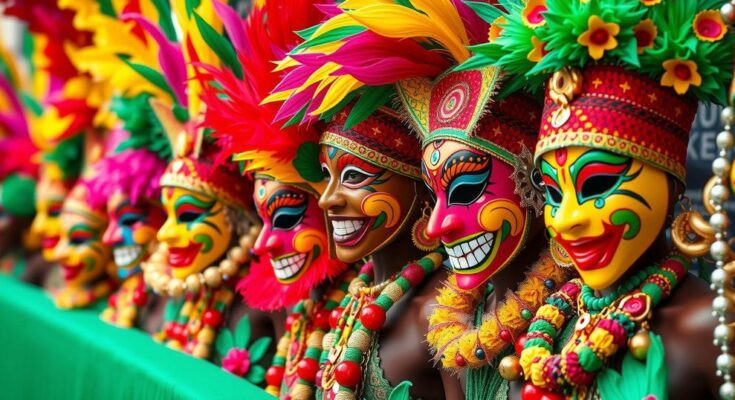The inaugural edition of “The Long Wave” explores Trinidad and Tobago’s carnival, emphasizing its deep African roots and cultural significance. The article discusses current events, the evolution of cultural ties between Africa and the Caribbean, and the enduring spirit of celebration amidst adversity, illustrating the carnival as a vital expression of identity and resilience.
In its inaugural edition, “The Long Wave” highlights Trinidad and Tobago’s carnival, a celebration deeply rooted in African heritage. The newsletter serves as a platform for connecting with individuals across the Black diaspora, with particular emphasis on recent conversations with Caribbean correspondent Natricia Duncan about the carnival’s significance, showcasing not only festivities but also cultural identities.
The newsletter also briefly addresses current events, including violent outbreaks in the Democratic Republic of the Congo and Guyana’s military response to Venezuelan incursions. It discusses the implications of recent reversals of diversity initiatives in the United States and examines the literary comeback of Nigerian author Chimamanda Ngozi Adichie, alongside the retirement of renowned samba singer Neguinho da Beija-Flor in Brazil.
The carnival tradition of Trinidad and Tobago, which originated in the late 1700s, represents a complex interplay of African culture and social critique against colonial oppression. Enslaved peoples utilized music and dance to affirm their cultural identity, transforming calypso from a medium of communication to a means of subversion, while the emergence of the steel pan exemplifies ingenuity against adversity.
The carnival serves as a vital cultural link within the diaspora, with West African influences evident in Caribbean dance and music. Natricia observes an increasingly tangible connection to Africa during this year’s festival, as exemplified by prominent Caribbean artists collaborating with African musicians and sharing a mutual appreciation for cultural heritage.
Both Natricia and Randall Mitchell, the Minister of Tourism, Culture and Arts, acknowledge the continuing kinship between Caribbean and African cultures, particularly in dance styles that trace back to West African roots. This renewed cultural awareness is paralleled by burgeoning geopolitical cooperation between nations in both regions on issues such as reparations and educational reforms.
This evolution signifies a revitalization of cultural and political ties, transcending historical divisions. Natricia highlights the changes brought about by social media, which has facilitated exposure to African cultures. The growing recognition of shared experiences resonates beyond geographical barriers and fosters a sense of unity.
Despite challenges, including crime rates in Trinidad and Tobago, the carnival remains a testament to resilience and the power of community. It embodies a platform for catharsis, allowing individuals to reclaim agency through celebration amidst adversity. Ultimately, the carnival stands as a living artifact, preserving connections to ancestors while encouraging contemporary expressions of joy and identity.
As Ramadan approaches, the newsletter seeks shared experiences related to the observance, inviting readers to contribute their reflections. This call to action reinforces the commitment to fostering dialogue and connection among diverse communities.
The article encapsulates the significance of Trinidad and Tobago’s carnival as a celebration rooted in African heritage, emphasizing cultural resilience and the persistent connection among the Black diaspora. It highlights the increasing recognition of shared identity between Africa and the Caribbean, as well as the challenges faced amidst social issues. Ultimately, the carnival serves as a unifying platform, fostering joy and cultural expression despite historical and contemporary adversities.
Original Source: www.theguardian.com




